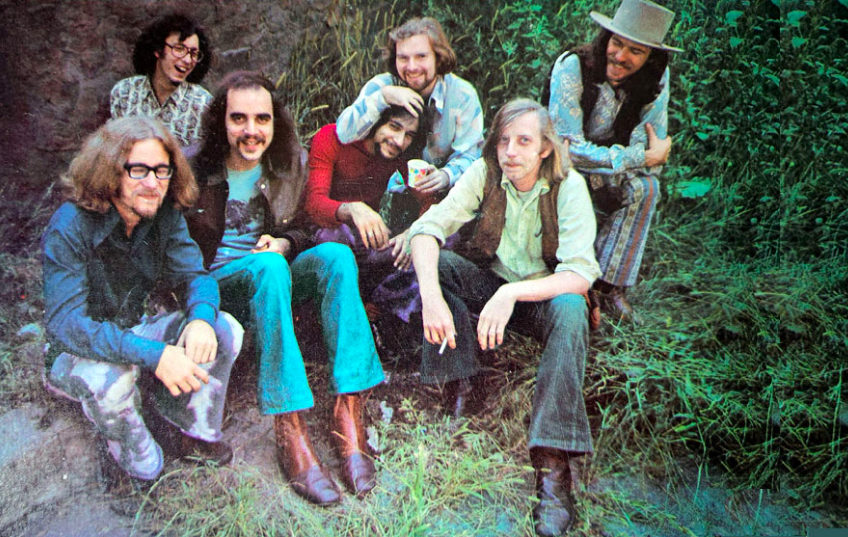I can’t remember what exactly it was that first drew me to Van Morrison. It likely started with hearing “Brown Eyed Girl” on my local oldies station but then Van became an artist that my friends and I gravitated to. I remember early on buying The Best of Van Morrison on cassette and once when my girlfriend and I won a billiards tournament our workplace was putting on, the prize was a gift certificate (before gift cards) for local record store, A&A Records (before that Canadian company went belly-up). I used the gift certificate to buy Van’s album Moondance on cassette. So, along with a Them tape, I began to fully explore what it was Van Morrison had to say to me. Turns out he had a lot to say to me. I am still feeling the effects of his message today over thirty years later.
I have always been susceptible to what I call a depth of feeling. Something in my childhood upbringing caused me to look inward while at the same time to look outward over the horizon. Music, in particular, has always made me feel deeply; the presence of the Spirit in a gospel song or the tender romance of a doo-wop ballad. Van Morrison has since the late 1960s written and performed music of colossal import infused with significant content that almost always went several stages deeper than just boy meets girl. Van’s music is about communion and I have always said that his main concerns were elucidating on three significant foundations of life; a woman, God and nature. Life doesn’t get much deeper than that.
Unless you throw in soul music. As a teenager, I couldn’t conceive of white guys singing soul or R&B and I didn’t realize that that was what guys like Van and Tom Jones and Daryl Hall and Mick Hucknall were doing. And then I learned about blue-eyed soul and it was a real awakening. Van Morrison has been a soul singer since day one – seems so obvious now – and that of course means that his music has always been infused with the sturdy spine and the expressive vocalizing that marks this my favourite music. Soul music is about the earth. It is rooted in the substantial experience of the church and it is aligned with the blues and this of course means that soul is about just that – the soul. There is an incredibly significant feel to soul music and when this aspect is added to Van’s other sensibilities mentioned above the result is a very profound listening experience.
“No white man sings like Van Morrison. As a physical fact, Morrison may have the richest and most expressive voice pop music has produced since Elvis Presley, and with a sense of himself as an artist that Elvis was always denied.”
Greil Marcus in his book Listening to Van Morrison
So, Van’s music is not just about romance and good times. He has applied his soul shouter’s touch to some weighty themes resulting in a career and a body of work that is truly unparalleled. When you think about it, Van Morrison has no peer. That might be a phrase that some would use only for giants like Sinatra or Presley but no one sounds like Van Morrison and no one has made records like his. No one has consistently combined the song traditions of soul, R&B and jazz with stream of consciousness poetry, vacillating between mantra-like chanting and scat singing with lyrics that mix nostalgia and longing for a return to carefree childhood with Christianity and Eastern mysticism. Van’s music has been called “Celtic soul” and this all brings us back to where we started; to a woman, God and nature. Morrison’s songs have a purity, they are at the same time grounded in deep, rich soil while their branches reach out into the night time sky – some of them detaching to soar over the horizon landing in Avalon.
Many legendary artists will continue making music into their 70s but the records they release are certainly different animals than their classic stuff. Many like Clapton or Mark Knopfler or Neil Young simply have more to say and so they say it but the purpose of these records is different; they are really not aimed at any charts, massive sales are not expected and they may not garner any awards. Van Morrison entered this stage around 2016. The previous year, he had released the retrospective package Duets: Re-working the Catalogue, an album who’s title indicates what it is – a set of songs from Van’s past presented in altered form with high-profile partners. He presents some deeper cuts like “If I Ever Needed Someone”, “Wild Honey” and “Some Peace of Mind” with appropriate guests like my man Steve Winwood, Bobby Womack and Van’s buddy and frequent collaborator Georgie Fame. The record performed well and afterwards Morrison embarked on a program that saw him release a seemingly endless flow of records, 6 of them coming in a 4-year stretch. You’re Driving Me Crazy with Joey DeFrancesco from 2018 was his 3rd LP in seven months and Van followed it up 8 months later with The Prophet Speaks, another record with the late jazzbo Joey.


Things got decidedly heavier with 2021’s sarcastically titled Latest Record Project, Volume 1. Critics noted the turn in Van’s lyrics to criticism he was levelling at – well, a lot of things. Song titles include “Where Have All the Rebels Gone?”, “No Good Deed Goes Unpunished”, “Tried to Do the Right Thing”, “The Long Con”, “Big Lie”, “Stop Bitching, Do Something” and my fave, “Why Are You on Facebook?”. The rock press rolled their eyes at grumpy Van saying the record had an “unhinged, rambling feel”, the lyrics were “boring and paranoid” resulting in “a genuinely depressing listen”. Also; “asinine context”, “transparently insane”, “insipid and infuriating” and “an angry man ageing disgracefully”.


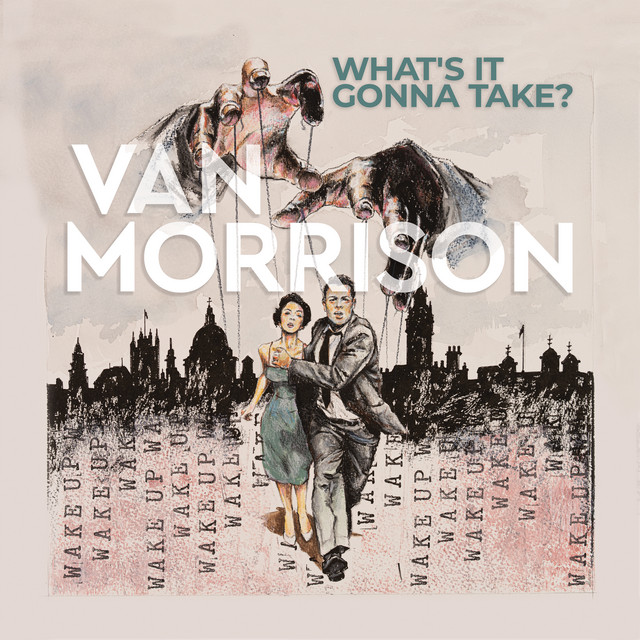
The follow-up a year later solidified Morrison’s stance and the critics revulsion. What’s It Gonna Take? features a creepy cover referencing Invasion of the Body Snatchers and the songs again descend into tales of general complaint over the state of the world. This time the lyrics fully embrace what has been called “COVID 19 denialism” and critics beefed again accusing Van of “monomania” calling the album “egocentric”, filled with “anger” and representing “a self-absorbed descent into COVID lunacy”. But this and his other recent records are not without their supporters with one critic declaring What’s It Gonna Take? a “cultural and philosophical breakthrough album (that) asks the question of the age”, praising Van’s “vigorous, inventive frame of mind” and saying in effect don’t blame Van if the album simply “describes the culture’s recent repression”.
But Van Morrison has earned the right. And in terms of chart activity, this negative press hasn’t hurt his releases. Since and including 1990’s Enlightenment – the first current Van album I ever bought – Morrison has released 22 studio albums under only his own name. All have charted and 13 of them have reached the Top Ten in the UK. His highest charting album in England has been Magic Time that reached #3 in 2005 and Stateside the honour goes to 2016’s Keep Me Singing that topped out at Number Nine.
Charts are one thing. Van Morrison, though, lives and works apart from them, standing alone. His albums Astral Weeks and Moondance are singularly brilliant and rank with the finest records ever made and his signature tune “Brown Eyed Girl” is revered like only a smattering of other songs are. His mammoth prolificacy is truly almost hard to believe. Like Bruce Springsteen, Van has written untold scores of songs, many not ending up on albums until years later, if at all. Morrison wrote every word and every note on Astral Weeks in 1968 and he wrote the entirety of What’s It Gonna Take? – almost 80 minutes of music – fully 50 years later and the 40-plus albums in between have been filled to the brim with his stunning craftsmanship. I’m not sure what else I can say.
What follows is the “best” of Van Morrison. These tracks should allow you to fully assimilate all that Van the Man from Northern Ireland has had to say. We will visit some classic, stand-out songs but also some I consider deeper cuts and added to these will be some selections from Van’s excellent 1960s band, Them.
It has rained overnight and the morning is hazy and wet. Let the two of us park by the side of the road and get out of the car. The rutted path leads to a garden and the stillness and quiet of the early morning envelopes us. We breathe deeply the fragrance of the earth. As we walk, let us look up into the sky as we enter a copse of trees. Before you can see it you can hear and smell the running water. We come out into a clearing and walk up to the water’s edge. We hold hands, communing with each other and with it all. Nothing else is needed and nothing else exists. Except the music...
“Caravan” // Introduced to me by legendary disc jockey Dr. Johnny Fever and part of what makes the Moondance album so sublime. Like “Wavelength” some years later, “Caravan” celebrates the joy of radio; listening to music and to the radio is something Van has celebrated often throughout his career. The fact that he listens to and loves as well as makes music that others listen to and love has always aligned him with us; he loves music as we do. Additionally here, Morrison uses a depiction of gypsy life to suggest harmony. “Caravan” has a gentle strut and a definite groove and the bass line drives the bus here as John Klingberg plucks those two heavenly notes up and down the melody. “Turn up your radio and a-letta me hear the song” Such simple words but, really, words of great import. The coda is a moment of rapturous bliss. If you said to me that “Caravan” is the greatest song this giant has ever recorded I would not gainsay it. Dig Van’s leg kicks as he does it live solo and with the Band in The Last Waltz.
Thanks eiddor
“Real Real Gone” // Here’s Van in the 90s in full-blown rhythm & blues singer mode. This tune from Enlightenment was fresh out and on the radio when I was first discovering Van. The horn chart is on point and the drummer’s quarter notes really add an impetus and a drive to this track. Van in the lyrics name checks great soul singers of the past like Sam Cooke, Wilson Pickett, Solomon Burke, James Brown and Gene Chandler.
“Brown Eyed Girl” // I hate to be so common as to love this song like everyone else does but y’know what? This song is perfect. However, there is something else to talk about here. As jubilant as “Brown Eyed Girl” is, I think it is one of the saddest songs I’ve ever heard. It is, after all, a nostalgic song of memory. The song goes along at a nice clip and so it’s hard to notice but the final verse is heartbreaking, every single line devastating until finally, Van asks the girl and all listeners “do you remember when we used to sing…” Yes, sadly, we do.
Critics have said that “Brown Eyed Girl” set a template of sorts for Van Morrison’s music. He presents an “idealized landscape” that links him to the Romantic poets he has loved and those he has returned to throughout his career and the song also references the radio as an essential companion. This Top Ten US hit is Van’s signature song and, according to Billboard, it remains “the most downloaded and most played song of the entire 1960s decade”. And maybe it is the perfect metaphor for life; on the surface, it is pure joy and can be accepted as that, full stop. It is traveling along the road on a sunny day. It is carefree if you keep yourself present. But if you allow your mind to wander and if you have a tendency – as I do – to allow your mind to dig a little deeper, you’ll feel a pang born of reminiscence and a little regret.
“Domino” // I was writing about “Brown Eyed Girl” and was about to note that it was Van’s biggest hit single Stateside. I went quickly for confirmation and learned that it wasn’t. “Brown Eyed Girl” reached #10 US Pop (only 60 in the UK) and “Domino” went one better, peaking at Number 9 in the US (didn’t chart in England!). A full-on R&B work-out, “Domino” starts with crisp guitar but listen, too, to the piano making it’s statement. And Van here in 1970 had such a great voice and his exhortations – “Hit it!” (or a grunt that sounds like that), “Lord, have mercy” and “Dig it!” – are in the finest R&B tradition. Spectacular horn chart. Notice that – once again – Van references the radio. I used to think I heard “dead kids all over the ground” when actually he sings “in that case I’ll go underground”. From the excellent His Band and the Street Choir album that is loaded with great songs.
“Whenever God Shines His Light” // A lovely, dancing piano opening graces this tune on which Van duets with the venerable Cliff Richard. The opener of Morrison’s 1989 record Avalon Sunset is an obvious and overt statement of “Morrison’s Christian commitment”; “Reach out for Him, He’ll be there. With Him your troubles you can share” The song features an exceptional vocal arrangement highlighted by inspired humming and a bouncing “put y’feet back, put y’feet back on higher ground, put y’feet back…”
“Memories” // This tune from 1990 snuck up on me until one day I realized it was absolutely killing me. Killing me with the sad longing of the accordion and the crushing resignation of the words; “Memories, all I have is memories…of you. How they linger in the twilight and in the wee small hours sometime just before the dawn. Memories, those summer days so long ago, the people and the places that we used to know. Oh, those memories…” A Celtic folk song, “Memories” is a song everyone can relate to. Never has murder been so gentle, so lilting…
Official Van
“And It Stoned Me” // Opening track of one of the greatest albums ever made, Moondance. Van has said that this is another song that harkens back to younger days when you “just got stoned from nature and you didn’t need anything else”. Morrison has also related a memory of a time when he was 12 and he went fishing. He stopped first at a derelict hut where lived a withered old man who gave Van water he said he had gotten from the nearby stream. “We drank some and everything seemed to stop for me. Time stood still. For five minutes everything was really quiet and I was in this ‘other dimension'”.
The song spills right out on you and is a mellow recitation featuring shimmering horns and a plucked acoustic. You can hear the placid rapture in Van’s voice as he enters the chorus the second time with “let it run all over me”. Nice, little piano solo.
“I’ve Been Working” // Shut the front door. Give me this song all. Day. Long. Ask me for an example of my favourite sounds in music and I have half-a-dozen songs I could play for you representing sounds that move me in the deepest part of my being. “I’ve Been Working” by Van Morrison is as good an example as any other I can think of. Three reasons; bass line, bass line, bass line. And horns, horns, horns. Without a solid rhythm section, without a bass player who knows how to find the pocket, don’t even talk to me. Ladies and gentlemen, again it’s Mr. John Klingberg. Cat only played on two Van albums but he’s got his own website, jammed with info. John passed in 1985 – he was only 40. I can’t even with this song. I can barely function after listening to it. With this song playing while I drive, I have driven my car off the road multiple times once killing a gopher and terrifying multiple cows.
This is the opposite of the previous tune’s “mellow”. It starts out mean, almost sinister as if it is saying “hang on to your hats”. Listen to the band while Van sings the opening couplets. This is a group of fellas who are dialled in. What they are doing so far is not standing out but it is a stone groove; those tight electric guitar statements. And then – floodgates. Van repeats “woman” while the horns build behind him until they all blast joined by a fantastic Hammond smear – one of the finest sounds found in recording. And repeat. And now that we’re all grooving and driving 30 over the limit, Van says it’s “alright, alright, alright” while the horns bleat and then we are into a stellar sax solo while the rhythm cruises along behind. “I’ve Been Working” has got to be one of the greatest of all funk songs to come from a white man. Van knows.
Official Van
“Soul is a feeling, feeling deep within. Soul is not the colour of your skin. Soul is the essence, essence from within. It is where everything begins”
– “Soul” from Keep It Simple (2008)
“Satisfied” // A relatively new song for me, this one from 1980’s Common One LP shows that Van never totally abandoned R&B. “Satisfied” is a soulful excursion in an album noted more for its free jazz leanings. One reviewer mentioned the record’s “trancelike power” and, while “Satisfied” is one of the more conventional songs on the album, it does contain a repetitive groove lead by the Hammond’s dancing drone and the recurrent blasts of the horns. After an abrupt breakdown, saxman Pee Wee Ellis blows a tasty solo alongside trumpeter Mark Isham. Nice, little hidden ditty from Van.
“Jackie Wilson Said (I’m in Heaven When You Smile)” // Totally infectious is this shout-out to the legendary Mr. Excitement. Van once again gives love to one of his heroes and he starts this energetic tune by scat singing the sax riff as the band gradually joins the fun. Just dig the swirling arrangement written for the reeds as they accompany Van’s wordless utterings. Critics have hailed the tune as being “about elation” and “freewheeling abandonment and joy” and they’ve got that bang on. One of them made this observation; “(this) is prime time Morrison: tight, melodic, fully vocalised from the centre-back of the throat”. This is a quintessential Van Morrison song; an R&B workout with a killer vocal and a stellar horn chart.
“Lonely Avenue/You Give Me Nothing But the Blues” // Too Long in Exile is a substantial record that did some to return Van’s blues cred after a couple of pop ventures (“Too long in exile, too long not singin’ my song”). On this record, Van works with John Lee Hooker on a great revival of “Gloria” and he pays homage to Ray Charles who had a hit with the Doc Pomus-penned “Lonely Avenue” in 1956. Morrison tacks on his own “You Give Me Nothing But the Blues”. Dig that Hammond sound and those tasty guitar licks. Van’s in no rush here and the band take turns making brief statements before the vocals kick in. Smoky, after hours, this is. What a vibe here. “Well, my sheets they feel like lead and my pillows they feel like stone” Magical to hear Van lapse into vocalese with his “I live way up on, I live way up on…” and “you, you, you, you, you, you, you…..gimme nothing but the blues”. Legend. His harmonica solo is otherwordly; a deep, guttural, tortured moan. But Van Morrison is not a straight blues man, you say. He’s not? Listen again. Smoky. After hours. Perfect recording. “I’m so tired this mo’nin'”
Official Van
“Cleaning Windows” // There may few greater songs extant to sing along with. And such groove. “Oh, the smell of the bakery from across the street got in my nose” Once again, Van looks back. As a nostalgic person myself, I feel extra connected to Van when he does the same. Here Van recalls the carefree and simple times before his career took off. He describes a day in his own life when he was still a working man and a part-time musician “blowin’ saxophone on the weekend”. He also provides a litany of his interests in music – “I went home and listened to Jimmie Rodgers in my lunch break…Heard Ledbelly and Blind Lemon on the street where I was born. Sonny Terry, Brownie McGhee and Muddy Waters singin’ ‘I’m a rollin’ stone'”) – and literature – “I went home and read my Christmas Humphreys book on Zen. Curiosity killed the cat, Kerouac’s Dharma Bums and On the Road“. It’s just the way he rolls out these vignettes.
I have loved this song for a couple of reasons, one is that On the Road is my favourite book. Another reason has been summed up nicely by critics who get it; Van’s happiness despite his routine work day is “made possible by the promise that at the end of the day he could enter the world of books and records”, something I can very much relate to. And also “Cleaning Windows” “boldly restates the self-help maxim that you are your own best friend”. Nice. With this beauty, Van Morrison has done us all a great service. Mark Knopfler guests on guitar on this single from ’82.
“Moondance” // Here is the finest jazz heard in any rock song this side of Steely Dan. The tune’s “soft jazz swing” is anchored by the walking bass line played by the aforementioned John Klingberg and Van himself considers it “a sophisticated song. Frank Sinatra wouldn’t be out of place singing that”. And of course he’s right; consider Michael Bublé’s later excellent rendition. “Moondance” was significant in Van’s career because it signalled to disc jockeys that Morrison could write and record radio-friendly material.
But more than that it is simply sublime. Klingberg’s bass, yes, but the piano pulses in jazz time and the drummer knows his rim shots. Van sings with the proper cadence, using his voice like an instrument; dig “well, I wanna make love to you tonight, I can’t wait ’til the morning has come. And I know now the time is just right and straight into my arms you will run”. The signal to break for the solos is pure jazz as are the solos themselves. Some tasty solo piano but dig the acoustic guitar strumming behind. And the sax solo? Forget about it, man. The final verse – an altered repeat of the first – is the magnificent cherry on the top of this flawless, timeless recording.
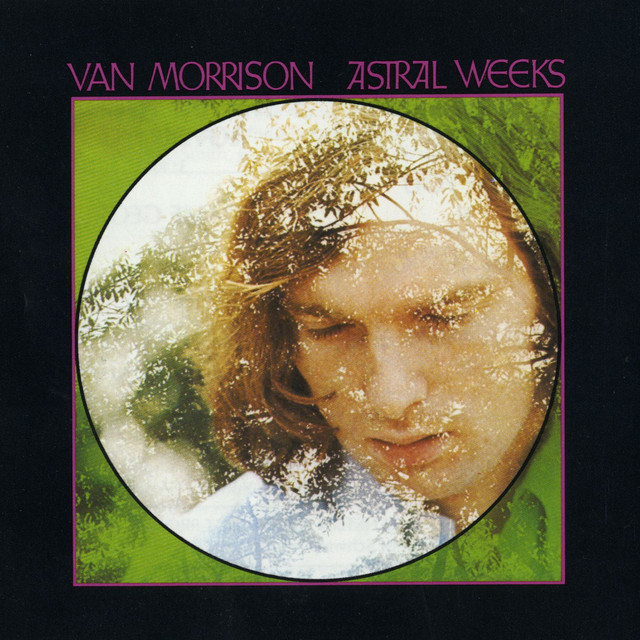
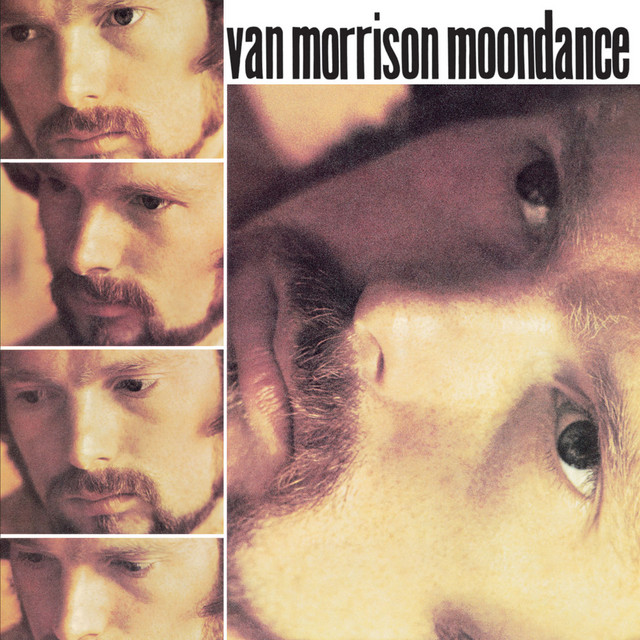

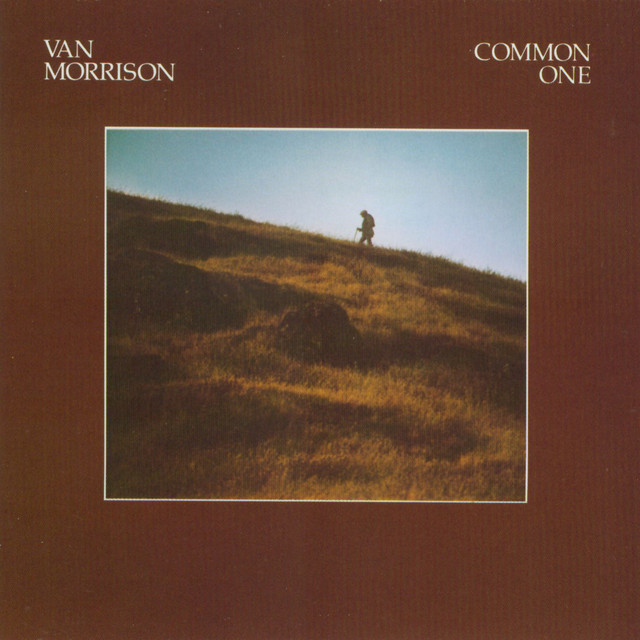
“In the Garden” // This is one of two paradigms in the Van Morrison canon. Meaning that – aside, I will allow, from Van’s soul/R&B leanings – this is what Morrison’s whole catalogue is about. This is what he does, this is his mission statement and this, I feel, is what Van Morrison has really always wanted to get across to the people. A woman. God. Nature. I have at times been able to really dial into this and it has been an incredibly moving experience.
The title aligns this track to the gospel song of the same name; they are both significant statements of tranquility and communion. Once again, Van speaks of the earth – the garden – and it is wet from a recent cleansing rain. And she is there. Through some eight verses, Van preaches his precepts and it is a consecrated thing. The musicians know to be gentle, barely audible, setting a reverent tone.
The payoff – the major statement – comes with “and I turned to you and I said ‘no guru, no method, no teacher just you and I and nature'” and Van repeats this, growing in intensity; “No guru, no method, no teacher. Just you and I and nature. And the Father and the Son and the Holy Ghost. In the garden wet with rain”.
Formality has been dispensed with. This is not an organized thing that has to be taught or studied. You don’t have to work to arrive at this place. You just need to feel. This is purity. This is the embrace of the holy, of the sacred. These are Van’s pillars of life and discernment and wisdom. The recording is transcendent. A favourite of the live shows, Van tried to explain it to a journalist; “It’s not about TM, forget about that. You should have some degree of tranquillity by the time you get to the end. It only takes about ten minutes to do this process”. Much like on Astral Weeks, Van sings here of being in a trance, of childlike visions and of returning to the garden, wet with rain.
Official Van
“Tupelo Honey” // Here is something else that Van did so well; his own brand of love song. Here he channels his beloved Romantic poets and sings lyrics to a sedate background making this not only love music but campfire music, front porch-and-coffee music. A country soul song, it has a gentle, almost ethereal quality to it. Consider that Bob Dylan – a songwriter of some note, himself – was enough in awe of it that he once said “‘Tupelo Honey’ has always existed…Morrison was merely the vessel and the earthly vehicle for it”. Hymn-like and pastoral, the song meanders a country lane but it is not without its impetus. Van’s insistence grows and he renders the chorus with increasing degrees of vehemence; “she’s – as – sweet – as tupelo honey”. Dig the backgrounds – “she’s an angel”.
“Sweet Thing” // Perhaps the most perfect of all of Van’s stunning creations. One of my absolute favourite songs and, along with “In the Garden”, “Sweet Thing” is Van Morrison’s creed, his ideology, his tenet. It is a monumental task for me to describe the majesty of this song and I don’t think I can do it again any better than I did when I listed it among my favourite songs – “Van Morrison has seen the other side. He has seen the alternate to this. He tells of it in ‘Sweet Thing’. He has found a place where he will not remember that he ever felt the pain, a place where he will never grow so old again, a place where he will be satisfied. “And I will walk and talk in gardens all wet with rain…” The place is fleeting, intangible, it slips through your fingers, not to be held or contained. But for these four minutes and ten seconds, the listener communes with Van in a state of the mind and of the senses”.
“Some Peace of Mind” // It was the early Nineties and I was prepared to buy any new Van Morrison material. I was not prepared, though, for Hymns to the Silence. I bought the double album on cassette so it came in one of those fancy cases that hold two tapes. The music on it leaned towards adult contemporary – I was troubled by a review from the time that referred to Van being in “lounge lizard” mode – and that was hard for the 20-year-old me. My gradual appreciation of the record had much to do with this song and an attractive lady from Amsterdam.
It’s a rarity when the appeal of a Van Morrison song is down to the work of someone other than Van Morrison. Not since Richard Davis’ bass playing on “Sweet Thing” has a guest contributed as much and stolen the show like alto saxophonist Candy Dulfer does on “Some Peace of Mind”. From the outset, the bubbling rhythm section and piano punctuations make the foundation for Candy to steady blow through the bulk of the song, taking a break only for the first verse as Van lays down the lyrics that speak of the very thing many of us are chasing. “‘Cause I’m just a man, doin’ the best I can. Don’t you understand I just want some peace of mind” Her stunning obbligato runs the tables even as it pauses to allow Georgie Fame (likely) a fine little Hammond solo. Listen to her at the six-minute mark of this song that makes excellent use of it’s six-and-a-half minute run time.
Official Van
“Into the Mystic” // Van Morrison’s second most streamed song on Spotify starts with that chopping acoustic guitar, that fine strumming. “When that foghorn blows you know I will be comin’ hommmme-ah. And when that foghorn whistle blows I gotta hear it, I don’t have to fear it. And I wanna rock your gypsy soul, just like way back in the days of old. And together we will flow into the mystic. Come on, girl” I’m not sure what else needs to be said. “Let your soul and spirit fly into the mystic”
“Youth of 1,000 Summers” // Another sneaky hidden gem from Van in the Nineties. Nice Hammond smear from Georgie Fame at the outset and fine playing from Fame throughout. This is at the very least a jubilant, hand-clapping work-out. “In my soul, in my soul, in my soul” But maybe there is something deeper going on with this lyric. Me, I hear a declaration that age is just a number. Anyways, it means springtime to me, this celebratory song.
Official Van
“Call Me Up in Dreamland” // Horns, please. This is the purest rhythm and blues laced with gospel. This song from His Band and the Street Choir is one of the many Van songs with lyrics that don’t really seem to say anything or mean anything. But you know what it is? It contains maybe my favourite chorus of any of Van’s tunes. Sing it with me now! “Call me up in dreamland, radio to me, man. Get the message to me any way you can. Let your river flow way down in your soul, never to grow old on a saxophone” Put this in a jar and put a label on it and I will buy it and become addicted. Van himself contributes some tenor sax. “Lord, have mercy”
“Piper at the Gates of Dawn” // An appropriately gentle place to end. This is a good “closing credits song”. Dig now; “Piper at the Gates of Dawn” is a chapter in the book The Wind in the Willows (1908) by Kenneth Grahame, a book Van references throughout the lyrics of this song. I have read* that the chapter can be considered a “fugue state”, the psychiatric definition of which is as follows; “a fugue state is when a person ‘steps off’, they lose their identity and the state is ‘often coupled with a flight from one’s usual environment, associated with certain forms of hysteria’. People reemerging from fugue states often have no memory of where they have been or who they were”. Seems to me that this state is similar to that which one enters when exploring the music of Van Morrison. As I walk through the sonic foliage of “In the Garden” or “Sweet Thing” or “Into the Mystic”, I often feel like I have “stepped off” and returning from those listening experiences can leave me in a dreamlike state. “This is the place of my song-dream, the place the music played to me”1
As regards this particular song, Morrison employs his Irish brother, the late Paddy Maloney, to blow his uilleann pipes. The gentlest acoustic strumming begins the tune and Van enters with his poetry. Lovely harmony vocals from Morrison protégé Brian Kennedy. “And they stood upon the lawn and listened to the silence. Of the wind in the willows…”
Official Van
Them: “Gloria” — What can I say? Van Morrison actually wrote this rock standard, this garage band staple and he did so when he was 18. Them performed some legendary versions in live settings, some 15 or 20 minutes long. “Into the heart of the beast…Van Morrison’s voice a fierce beacon in the darkness, the lighthouse at the end of the world. Resulting in one of the most perfect rock anthems known to humankind”2
Them: “My Lonely Sad Eyes” — The hidden gem in Them’s catalogue. An early wistful, tender song from Van’s pen, this is springtime. The lovely, swirling organ sets the tone and the lyrics help place you where you should be; “Throw me a kiss across some crowded room some sunny windswept afternoon…”
Provided to YouTube by Legacy Recordings
Them: “Baby, Please Don’t Go” — Here’s a traditional blues song that dates back to 1935. Them made it a popular rock song after releasing their 1964 version that may have included in some way the playing of a young Jimmy Page. Whoever is playing those guitar licks on this tune is operating on another plane. And that throbbing two-note bass guitar line? Love it. Van’s rambling exhortations, the blasting blues harp, the keyboards; everything gelling. “Know how I feel right now — my baby leavin’ — on that midnight train — and I’m cryin'” *blows harp for dear life*
Them: “Turn On Your Lovelight” — This is fully check-it-out tasty. Them was doing this in a club in the early days and a fan recorded it. It was on the strength of this recording that the group got their deal with Decca. This is perfect for fast driving, even just the first 30 seconds. That descending bass note and that swingin’ Sixties keyboard sound. Dig the breakdown; “I git a little lonely in the middle of the night…” The only problem is it’s less than 2-and-a-half minutes long. But how long would be “long enough” for this gem? Hours, maybe.

Sources
- A WineDark Sea: The Piper at the Gates of Dawn. Sarah Toa (2012)
- Rock and Roll: The 100 Best Singles. Paul S. Williams (1993)



